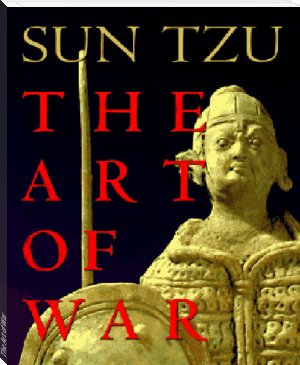The Art of War by Zi Sun (phonics reader .txt) 📖

- Author: Zi Sun
- Performer: 0976072696
Book online «The Art of War by Zi Sun (phonics reader .txt) 📖». Author Zi Sun
10. (5) When you start a fire, be to windward of it. Do not attack from the leeward.
[Chang Yu, following Tu Yu, says: "When you make a fire, the enemy will retreat away from it; if you oppose his retreat and attack him then, he will fight desperately, which will not conduce to your success." A rather more obvious explanation is given by Tu Mu: "If the wind is in the east, begin burning to the east of the enemy, and follow up the attack yourself from that side. If you start the fire on the east side, and then attack from the west, you will suffer in the same way as your enemy."]
11. A wind that rises in the daytime lasts long, but a night breeze soon falls.
[Cf. Lao Tzu's saying: "A violent wind does not last the space of a morning." (TAO TE CHING, chap. 23.) Mei Yao-ch`en and Wang Hsi say: "A day breeze dies down at nightfall, and a night breeze at daybreak. This is what happens as a general rule." The phenomenon observed may be correct enough, but how this sense is to be obtained is not apparent.]
12. In every army, the five developments connected with fire must be known, the movements of the stars calculated, and a watch kept for the proper days.
[Tu Mu says: "We must make calculations as to the paths of the stars, and watch for the days on which wind will rise, before making our attack with fire." Chang Yu seems to interpret the text differently: "We must not only know how to assail our opponents with fire, but also be on our guard against similar attacks from them."]
13. Hence those who use fire as an aid to the attack show intelligence; those who use water as an aid to the attack gain an accession of strength. 14. By means of water, an enemy may be intercepted, but not robbed of all his belongings.
[Ts`ao Kung's note is: "We can merely obstruct the enemy's road or divide his army, but not sweep away all his accumulated stores." Water can do useful service, but it lacks the terrible destructive power of fire. This is the reason, Chang Yu concludes, why the former is dismissed in a couple of sentences, whereas the attack by fire is discussed in detail. Wu Tzu (ch. 4) speaks thus of the two elements: "If an army is encamped on low-lying marshy ground, from which the water cannot run off, and where the rainfall is heavy, it may be submerged by a flood. If an army is encamped in wild marsh lands thickly overgrown with weeds and brambles, and visited by frequent gales, it may be exterminated by fire."]
15. Unhappy is the fate of one who tries to win his battles and succeed in his attacks without cultivating the spirit of enterprise; for the result is waste of time and general stagnation.
[This is one of the most perplexing passages in Sun Tzu. Ts`ao Kung says: "Rewards for good service should not be deferred a single day." And Tu Mu: "If you do not take opportunity to advance and reward the deserving, your subordinates will not carry out your commands, and disaster will ensue." For several reasons, however, and in spite of the formidable array of scholars on the other side, I prefer the interpretation suggested by Mei Yao-ch`en alone, whose words I will quote: "Those who want to make sure of succeeding in their battles and assaults must seize the favorable moments when they come and not shrink on occasion from heroic measures: that is to say, they must resort to such means of attack of fire, water and the like. What they must not do, and what will prove fatal, is to sit still and simply hold to the advantages they have got."]
16. Hence the saying: The enlightened ruler lays his plans well ahead; the good general cultivates his resources.
[Tu Mu quotes the following from the SAN LUEH, ch. 2: "The warlike prince controls his soldiers by his authority, kits them together by good faith, and by rewards makes them serviceable. If faith decays, there will be disruption; if rewards are deficient, commands will not be respected."]
17. Move not unless you see an advantage; use not your troops unless there is something to be gained; fight not unless the position is critical.
[Sun Tzu may at times appear to be over-cautious, but he never goes so far in that direction as the remarkable passage in the TAO TE CHING, ch. 69. "I dare not take the initiative, but prefer to act on the defensive; I dare not advance an inch, but prefer to retreat a foot."]
18. No ruler should put troops into the field merely to gratify his own spleen; no general should fight a battle simply out of pique. 19. If it is to your advantage, make





Comments (0)